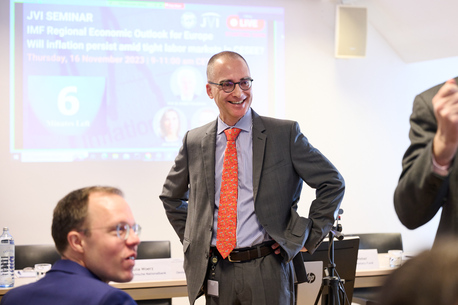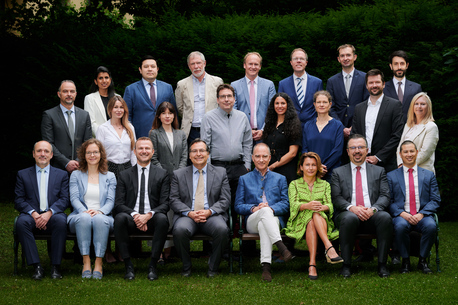Interview with Hervé Joly, Departing Director of the JVI
July 15, 2025
Hervé Joly has been the JVI Director for the last five years. On the occasion of his departure, we interviewed him and asked him to share his experience and views on the JVI and Vienna, on challenges and achievements at the JVI, and on his role in this process.
Hervé, this autumn you are leaving the IMF after 26 years of an interesting and challenging career. Looking back at those years, what was your most memorable assignment?
It’s difficult to answer this question, because my assignments were diverse and all deeply rewarding. Over the years, I have worked on a broad range of countries, including Algeria, Lebanon, Mozambique, Pakistan, Senegal, Syria, Tanzania, on IMF lending policies and debt issues. More recently I was involved in what the IMF calls “capacity development” (CD). This includes training and technical assistance, first in East Africa and more recently at the JVI. It is not well known, but the provision of CD support is one of the three main missions of the IMF. The Fund is a great place to have a career if you are an economist interested in policy and operational issues. As you will have noticed, most of my work at the IMF focused on developing countries, because I always felt this was the area where the IMF could have the biggest positive impact.
How would you describe your experience leading the JVI? What makes the JVI special?
Leading the JVI has been a great way to conclude my IMF career. The work carried out here is especially meaningful, with its impact felt far beyond the classroom. The most powerful testimony of this is the alumni I met in my job, and there are many of them: more than 55,000 participants have been trained at the JVI since its founding in 1992! These alumni are all very grateful for the training they have received here, and they stress the big impact it has had on their professional growth and the strengthening of the institutions they serve. Many of them have risen to prominent positions, with some becoming ministers, central bank governors, or even heads of state. Another defining strength I would mention is the range of partnerships that we have at the JVI, which is unique among IMF regional training centers and allows us to offer a richer curriculum. The last thing that is very special at the JVI is its staff; it is a group of highly talented and motivated people. It has been a real pleasure collaborating with them.
What was the biggest challenge that you had to overcome during your time here?
Like everybody else, I found the Covid-19 years particularly challenging. The JVI and its partners managed to continue delivering a large volume of training, entirely in virtual format, and this was a source of great pride for all of us. Yet the shift to remote work for nearly two years came at a cost. What I really missed was the daily in-person interactions with my colleagues and the buzz and energy you feel at the JVI when classrooms are full of course participants. The JVI is at its best when it is alive with conversation, ideas, and connections, and that spirit was hard to replicate on a screen.
How has the JVI under your management responded to the new training needs, both in terms of delivery but also in terms of content?
When we resumed in-person delivery in mid-2022, we all realized that we could not go back to business as usual after two years of virtual delivery, as the landscape of learning had changed. We made an early decision to keep in-person training in Vienna at the core of the JVI experience, while experimenting with ways of combining online, virtual, and in-person delivery ( “blended learning” in our jargon). This has worked well, and we now have several blended courses in our curriculum. Together with our colleagues in the IMF Capacity Development Center in Kazakhstan, we have also launched “cohort” training, whereby the same group of participants is taken through two courses together as a group. The results have been highly successful, judging from the learning gains of participants and the feedback from various stakeholders. We have also tried to be agile in developing new courses addressing emerging issues. This year, for instance, we have two new offerings related to artificial intelligence, one targeting central banks and the other for fiscal authorities.
2025 marks a lot of changes for the JVI: new director and deputy director at the same time, plus sizable changes in the economic faculty and among program officers. What message would you like to pass on to the next JVI director? And what would be your message to the JVI staff and future course participants?
I would like to tell Ben Kelmanson, who will take over in the coming weeks, that he should not worry! The JVI has had similar episodes of high turnover in the past, and thanks to good planning and strong institutional foundation everything continued to run smoothly, and it will this time again. The JVI is a very attractive place, and we consistently attract high-caliber staff. And of course, many of the current colleagues will still be around for a while. Trust the JVI team, as I was told by my predecessor! It was excellent advice then, and it still holds true today.
We hear you are retiring in Vienna. What convinced you to make this choice?
My wife and I are both French and we wanted to stay in Europe after my time at the JVI; this is why I am retiring from the IMF. The choice was basically between staying in Vienna, which has been home for us in the past five years and where we now have many friends, or going back to France, which we left 28 years ago but where we still have family and friends. It was not an easy decision to make. But in the end, one argument tipped the scales: the quality of life in Vienna is simply unbeatable!
Rilind Kabashi, Senior Economist and Newsletter Editor, JVI











